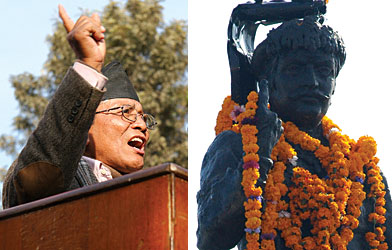 KIRAN PANDAY |
How does one define politics in Nepal, especially when it comes to the use of power? The definition of politics before the 1990 era can be explained by the Nepali term rajniti, which in its literal sense means raja ko niti � the king's policy. This definition implied that all ordinances came from the king, one who was above the law, and could not be contested because any policy that came from the royal institution was also by its literal Nepali definition, sabai bhanda ramro niti, that is, 'the best of policy'. Of course the king had his advisors to guide and caution him but fundamentally there were no constraints on his use of power. Power at the time was in the literal sense the 'king's authority'.
The second definition of politics follows the 1990 democratic movement. This movement introduced the western concept of liberal politics, where 'politics is the constrained use of power'. Constraints include the parliament, judiciary and the various bureaucratic institutions, providing different levels of checks and balances within the governing system. Most importantly, no one is considered above the law.
The 1990 movement in its democratic essence should have brought about the end of the first definition of politics. But in the years that followed, including after the 2005 movement, the dual implementation of the first and second definitions has brought about a moral decadence in the overall polity and society of Nepal. Regardless of what happened before 1990, the current definition of politics cannot be said to be adhering to the fundamental principles of democracy.
Quite contradictorily, our leaders straddle both definitions, using whichever is convenient for them. They use the first definition to dodge accusations, lapses of duty, or to delay decision making that may not be in their favour and to avoid punishment for any unlawful act. They use the second definition to prop up their false democratic rhetoric for the people. Besides other explanatory variables, the interchangeable use of these two definitions also accounts for why nepotism, favouritism and 'partyism' continue to run rampant; why coming to a consensus in writing a new constitution seems so difficult; why it took 18 elections to choose a prime minister; why Devi Prasad Regmi was thrown into jail for the slap case while minister Begum escaped punishment for a similar incident; why we hear commitments from successive governments that the loadshedding problem will be solved in five years; and why improvements in security are hyped up when we know our borders are in their most vulnerable state to date.
Some may argue that since politicians are rational they obviously juggle these two definitions for an optimum outcome. But rationality, and most importantly democracy, cannot operate without a set of rules where the game is fair and everybody is equal in the eyes of the law. The leap into the democratic era, or the republic, is a symbolic rupture between the old and the new. It should herald a transformation in which, according to Weber, power should be embodied in the formal organisations of rationality, by which he meant power governed by a set of rules.
Flipflopping on both definitions makes for a dysfunctional system of governance and fosters moral decay in the people who believed in and voted for them, only to be let down. Raising the price of oil one day and sending one's own student union to the streets the next day is akin to a split personality disorder. Similarly, there can be no justification for keeping the country hostage for almost seven months as 18 elections ran their course. This is a modus operandi worse than the rulers of the pre-1990s would have chosen. Ambiguity in political actions sends out a message of futility and fickleness of governance, stalls any hope of development and progress, and generates frustration in the people that will inevitably lead to the demise of the regime.
A strong regime is one that conforms to a single definition of politics, sticking to the norms of a democratic republic, in which there is a set of rules based on the principles of equality and freedom. Unless the people of Nepal feel that everyone is equal by law, they won't see a difference between the politics of Naya Nepal and the old Nepal. Real change does not necessarily stem from the election of a new prime minister, or by overthrowing governments. Real change will come when the people of Nepal finally sense the fundamentals of democracy being implemented.
Biraj Bahadur Bista is a PhD candidate at the Department of Political Science in Seoul National University, South Korea
READ ALSO:
Shed some light, EDITORIAL
Same-same, PRASHANT JHA
The India factor, PRANAB DHAL SAMANTA



